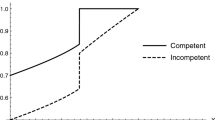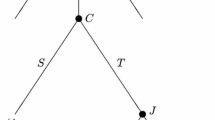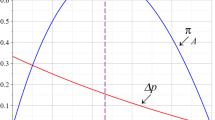Abstract
Our paper addresses issues of redistribution within a political economy framework. Focusing initially on the experiences of Haiti and Jamaica, we argue that the rulers of these countries redistribute resources basically in order to improve their chances of staying in power. The methods used to redistribute income are discussed in some detail; in particular, we extend the Magee, Brock and Young hypothesis of “optimal obfuscation” by postulating that rulers attempt to prevent opponents to disclose the actual costs of policies by increasing the costs of such exposure. Further, we generalize our findings into two models of endogenous policy formation—one for a democracy and one for a dictatorship. The equilibrium is specified and the influence of a number of shift parameters is investigated.
Similar content being viewed by others
Author information
Authors and Affiliations
Additional information
Earlier versions have been presented at the Arne Ryde Symposium on the Economic Analysis of Law, University of Lund, Sweden, August 19–21, 1993 and at the Eastern Economic Association Meeting in New York, March 26–29, 1992. We are grateful to William Brock, Ronald Findlay, Markos Mamalakis and Francisco Thoumi and an anonymous referee for helpful comments, and to Stephen Magee for supplying some unpublished material. The usual disclaimers apply.
Rights and permissions
About this article
Cite this article
Danielson, A., Lundahl, M. Endogenous Policy Formation and the Principle of Optimal Obfuscation: Theory and Some Evidence from Haiti and Jamaica. Comp Econ Stud 36, 51–78 (1994). https://doi.org/10.1057/ces.1994.26
Published:
Issue Date:
DOI: https://doi.org/10.1057/ces.1994.26




